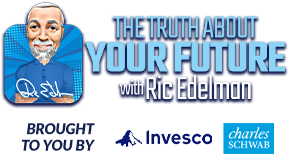Guess the New Challenge Facing Home Buyers and Sellers
It’s not just high prices and interest rates
Ric Edelman: It's Monday, May 6th. On today's show, a new challenge for homebuyers and sellers. You think about buying a house? You know the challenge that is these days, interest rates are at their highest level in years, more than 7% for 30 year mortgages right now, and there aren't really all that many houses for sale, because current homeowners, well, they refinanced their loans back when interest rates were low, and they locked in those 3% mortgages.
They know that if they sell, they're going to lose those 3% loans. They'll have to get new loans on their new houses at 7% today's rates, so they're not selling. And when you have fewer properties on the market, lots of potential buyers, there's an imbalance between buyers and sellers, and that's a big reason why home prices are at all-time highs.
So if you do manage to buy house to buy, you're going to pay a lot for it, and you're going to pay a lot of interest on that mortgage, so much so that it can be difficult to qualify for the loan. And if all that's not challenging enough, let me pile on. All over America, houses are becoming uninsurable.
The reason? The increase in natural disasters. Wildfires, mudslides, tornadoes, hurricanes, rising sea levels, you name it. Insurance companies have been paying out more in claims than ever, and a lot more than they expected. As a result, they are raising rates to unaffordable levels in many cases for a lot of people in cities and towns all around the country and in many places, these insurance companies are flat out refusing to insure properties, even canceling properties that they currently have coverage on.
In Santa Clara, for example, in California, 85% of the properties in one zip code were dropped by their insurers over a six-year period. Seven million people have been forced to pay higher rates across the country because of rising risks from damage of floods, wind, hail, and wildfires. The average cost for home insurance is now about $2,000 a year.
In Florida, it's three times higher than that. And the prices rose 42% last year. 15 insurance companies have stopped doing business in Florida altogether, or reduced their sales. And when there is damage or injury, there are lawsuits that follow. And the insurance companies end up with expensive litigation.
Florida has 7% of property claims, but 76% of the nation's lawsuits. If you were an insurance company, why would you want to do business in Florida? In California, on the other side of the country, it's a different problem. Consumer protection laws. Insurance companies are prohibited from raising premiums as much as they want, so they say they are pretty much guaranteed to lose money.
So State Farm, Allstate, Farmers Insurance, they're all reducing the number of policies they're willing to sell. And then there's National Flood Insurance. No insurance company is stupid enough to insure houses that are built on the water. So, to appease local developers, Congress created the NFIP in 1968, the National Flood Insurance Program.
That program lost $16 billion just from Hurricanes Harvey, Irma, and Maria. And the Government Accountability Office says that for 40 years the rates that people pay to be covered by the National Flood Insurance Program are not as high as they ought to be. Which means taxpayers nationwide are footing the bill for people who own beachfront properties.
But now flood insurance rates are going up just like private insurance. If you have National Flood Insurance, you can expect your premiums to rise, if they haven't already. They can't rise more than 18% a year, but the total increase will be 400%. 200,000 homeowners have already canceled their flood insurance policies.
As a taxpayer, I say thank you very much. I'm no longer on the hook for your property. But if you're that homeowner, what are you going to do if you can't get private insurance? You'll be on your own when the next hurricane hits. And that is causing some homeowners to sell their risky properties. That's a challenge for them if you're thinking about buying a house, and that's a challenge for home buyers.
If you're thinking of buying a house, do not make an offer on it until you can confirm that you can buy homeowners insurance, and you need to confirm what the price of that insurance will be, and then you still have to wonder if the insurance company might triple your rate in the future, or even flat out cancel your coverage.
The last thing you want to find is yourself owning a home where insurance premiums are more than you can afford. Or even worse, a house that you can't get coverage on at all. And you certainly don't want to be someone who owns a house that no one will buy because they can't get insurance for it. If you thought buying a house was a challenge these days, that challenge is even worse than you thought.
On tomorrow's show, my commencement address at Rowan University.
-----
Subscribe to podcast updates: https://form.jotform.com/223614751580152
Ask Ric: https://www.thetayf.com/pages/ask-ric
-----
Follow Ric on social media:
Facebook: https://www.facebook.com/RicEdelman
Instagram: https://www.instagram.com/ric_edelman/
LinkedIn: https://www.linkedin.com/in/ricedelman/
X: https://twitter.com/ricedelman
YouTube: https://www.youtube.com/@RicEdelman
-----
Brought to you by:
Invesco QQQ: https://www.invesco.com/qqq-etf/en/home.html
Schwab: https://www.schwab.com/
Disclosure page: https://www.thetayf.com/pages/sponsorship-disclosure-fee
-----



